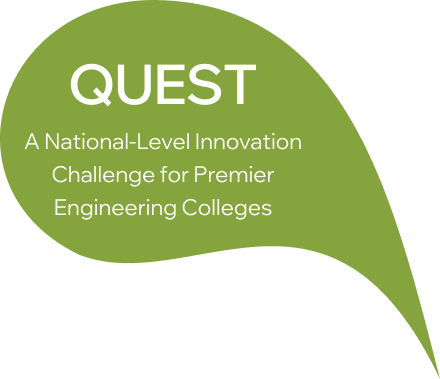

HPCL-Mittal Energy Limited (HMEL) invites the brightest engineering minds to bring fresh thinking, bold ideas, and cutting-edge technology to solve some of the most pressing energy and sustainability challenges of our time.
This is your opportunity to think beyond the classroom, innovate with purpose, and contribute to a brighter, greener future.
B.Tech & M.Tech students from recognised institutions.
2-5 members per team including mentor
Interdisciplinary groups encouraged!
Craft your solutions with the chosen themes in mind, demonstrating both creativity and relevance to the problem statements.

 1st Prize
1st Prize Champion Team
Champion Team Top Winner
Top Winner
 2nd Prize
2nd Prize 10 Teams
10 Teams Excellence
Excellence
 Institute Award
Institute Award Institution Level
Institution Level Top Performer
Top PerformerThe R&D and Innovation Department of HMEL is delighted to announce the results of the QUEST 2025 Innovation Challenge - an initiative to ignite creativity and engineering excellence among students across India.
This year, more than 200 teams from premier institutes participated in diverse themes spanning decarbonization, renewable energy, AI/ML for manufacturing and hydrogen technology. After rigorous evaluation, 24 teams were shortlisted for the final round. Following jury deliberation and committee approval, the winners are as follows.

Harshita Sharma, Ishani Mandal, Ali Samad Sk
Mentor:- Dr. Sujata Sardar
Institute:- Jadavpur University


| Team | Institute |
|---|---|
|
|
Indian Institute of Technology Guwahati |
|
|
National Institute of Technology Hamirpur |
|
|
National Institute of Technology Tiruchirapalli |
|
|
KIET Group of Institutions Ghaziabad |
|
|
Indian Institute of Technology Roorkee |
|
|
SRM Institute of Science and Technology, Chennai |
|
|
Dr. SSB UICET, Panjab University |
|
|
Rajiv Gandhi Institute of petroleum Technology |
|
|
Rajiv Gandhi Institute of Petroleum Technology |
|
|
Rajiv Gandhi Institute of Petroleum Technology |
|
|
Government Engineering College Aurangabad |


Rajiv Gandhi Institute of Petroleum Technology (RGIPT), Amethi, Uttar Pradesh
In recognition of the practical potential and alignment with HMEL’s innovation roadmap, four teams have been selected for project development and incubation support under the R&D and Innovation Department, HMEL. The details of these selected projects will be communicated separately to the respective teams.
Congratulations to all the winners!
Please write to info.quest@hmel.in for any queries.